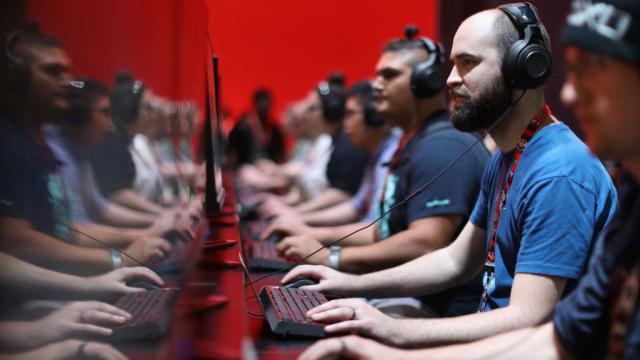A recent study found that people who played first-person shooter video games showed shrinkage in their hippocampus, the region of the brain responsible for both memory management and spatial navigation. But is playing Call of Duty really that bad for you, and if so, can a daily dose of Super Mario 64 balance everything out?
Image credit: Christian Petersen/Getty
The Headline: New Study Links Video Games To Brain Damage [Geek]
The Story: The study tracked a group of self-described non-gamers over the course of four years using MRI scans to determine how playing certain games affects their brain’s makeup. Subjects who played action games such as Call of Duty and Grand Theft Auto 5 saw a decrease in their hippocampus‘ grey matter.
[referenced url=”https://www.lifehacker.com.au/2017/04/are-video-games-keeping-young-men-unemployed/” thumb=”https://www.lifehacker.com.au/wp-content/uploads/sites/4/2017/04/controller-410×231.jpg” title=”Are Video Games Keeping You Unemployed?” excerpt=”Video games keep getting more complex and visually appealing, so it’s no wonder more people are drawn to them nowadays. But this new era of compelling digital entertainment could have a dark side for unemployed young men.”]
Reduction of grey matter in the hippocampus isn’t exactly a good thing, especially if you’re older. “You want your hippocampus to be robust, full of grey matter, and ability to form new connections,” clinical psychologist Greg Fonzo, who was not involved in the study, says. But he also doesn’t think you should be worried about losing precious grey matter while you enjoy a game of Counter-Strike, as long as you’re taking steps to mitigate the damage. And according to the study, the antidote may actually be other video games.
“It’s a tradeoff, because [people who play action games] show increases in other areas of mental function,” Fonzo points out. While their hippocampus shrank, they also showed increases in grey matter in their caudate nucleus, a region of the brain partially responsible for habit learning.
The researchers think the shrinkage happens because action games, which often include direct routes and map overlays on the screen, don’t use the spatial mapping abilities of the hippocampus. Instead, they reward habits such as following a particular route and quickly responding to a familiar threat. They can also create feelings of stress, which both Fonzo and the researchers point out has been associated with decreases in grey matter.
[referenced url=”https://www.lifehacker.com.au/2011/05/science-explains-why-your-memory-gets-worse-as-you-get-older/” thumb=”https://www.lifehacker.com.au/wp-content/uploads/sites/4/2017/06/brain-power.jpg” title=”Science Explains Why Your Memory Gets Worse As You Get Older” excerpt=”The fact that our memories degrade over time is nothing new. Everyone knows that as we get older it’s harder to remember where you put your keys or parked your car. Now, one neuroscientist thinks he understands how it happens.”]
On the other hand, subjects who played a Mario Brothers 3D platform games saw an increase in the grey matter of their hippocampus. So you probably don’t need to worry about losing precious grey matter while you enjoy a game of Borderlands 2, as long as you’re playing other types of games. The researchers who did the study propose that “the ideal is a balanced use of both the hippocampus and caudate nucleus memory systems,” so it’s probably fine to play action games as long as you use your brain in other ways too.
The Takeaway: Sure, you shouldn’t sit around playing video games all day. Just like Dad used to say, it will rot (well, at least a part of) your brain. But the damage isn’t permanent, and you can even add some grey matter to your dome by playing the right games, ones that encourage exploration and problem solving rather than just camping and sniping soldiers online.

Comments